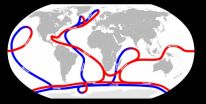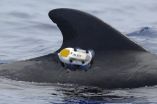(Press-News.org) Most of the concerns about climate change have focused on the amount of greenhouse gases that have been released into the atmosphere.
But in a new study published in Science, a group of Rutgers researchers have found that circulation of the ocean plays an equally important role in regulating the earth's climate.
In their study, the researchers say the major cooling of Earth and continental ice build-up in the Northern Hemisphere 2.7 million years ago coincided with a shift in the circulation of the ocean – which pulls in heat and carbon dioxide in the Atlantic and moves them through the deep ocean from north to south until it's released in the Pacific.
The ocean conveyor system, Rutgers scientists believe, changed at the same time as a major expansion in the volume of the glaciers in the northern hemisphere as well as a substantial fall in sea levels. It was the Antarctic ice, they argue, that cut off heat exchange at the ocean's surface and forced it into deep water. They believe this caused global climate change at that time, not carbon dioxide in the atmosphere.
"We argue that it was the establishment of the modern deep ocean circulation – the ocean conveyor – about 2.7 million years ago, and not a major change in carbon dioxide concentration in the atmosphere that triggered an expansion of the ice sheets in the northern hemisphere," says Stella Woodard, lead author and a post-doctoral researcher in the Department of Marine and Coastal Sciences. Their findings, based on ocean sediment core samples between 2.5 million to 3.3 million years old, provide scientists with a deeper understanding of the mechanisms of climate change today.
The study shows that changes in heat distribution between the ocean basins is important for understanding future climate change. However, scientists can't predict precisely what effect the carbon dioxide currently being pulled into the ocean from the atmosphere will have on climate. Still, they argue that since more carbon dioxide has been released in the past 200 years than any recent period in geological history, interactions between carbon dioxide, temperature changes and precipitation, and ocean circulation will result in profound changes.
Scientists believe that the different pattern of deep ocean circulation was responsible for the elevated temperatures 3 million years ago when the carbon dioxide level in the atmosphere was arguably what it is now and the temperature was 4 degree Fahrenheit higher. They say the formation of the ocean conveyor cooled the earth and created the climate we live in now.
"Our study suggests that changes in the storage of heat in the deep ocean could be as important to climate change as other hypotheses – tectonic activity or a drop in the carbon dioxide level – and likely led to one of the major climate transitions of the past 30 million years," says Yair Rosenthal, co-author and professor of marine and coastal sciences at Rutgers
INFORMATION:
The paper's co-authors are Woodard, Rosenthal, Kenneth Miller and James Wright, both professors of earth and planetary sciences at Rutgers; Beverly Chiu, a Rutgers undergraduate majoring in earth and planetary sciences; and Kira Lawrence, associate professor of geology at Lafayette College in Easton, Pennsylvania.
DENVER – A better survival outcome is associated with low blood levels of squamous cell carcinoma antigen, or absence of tumor invasion either into the space between the lungs and chest wall or into blood vessels of individuals with a peripheral squamous cell carcinoma, a type of non-small cell lung cancer (NSCLC).
Lung cancer is the most common cause of cancer-related death worldwide and lung squamous cell carcinomas (SCC) account for 20-30% of all NSCLC. SCC can be classified as either central (c-SCC) or peripheral (p-SCC) depending on the primary location. While ...
VIDEO:
On Oct. 23, while North America was witnessing a partial eclipse of the sun, the Hinode spacecraft observed a 'ring of fire' or annular eclipse from its location hundreds of...
Click here for more information.
The moon passed between the Earth and the sun on Thursday, Oct. 23. While avid stargazers in North America looked up to watch the spectacle, the best vantage point was several hundred miles above the North Pole.
The Hinode spacecraft was in the right place at the ...
DURHAM, N.C. -- Many marine animals are world travelers, and scientists who study and track them can rarely predict through which nations' territorial waters their paths will lead.
In a new paper in the journal Marine Policy, Duke University Marine Lab researchers argue that coastal nations along these migratory routes do not have precedent under the law of the sea to require scientists to seek advance permission to remotely track tagged animals in territorial waters.
Requiring scientists to gain advance consent to track these animals' unpredictable movements is impossible, ...
DURHAM, N.C. – Frogs are well-known for being among the loudest amphibians, but new research indicates that the development of this trait followed another: bright coloration. Scientists have found that the telltale colors of some poisonous frog species established them as an unappetizing option for would-be predators before the frogs evolved their elaborate songs. As a result, these initial warning signals allowed different species to diversify their calls over time.
Zoologists at the National Evolutionary Synthesis Center (NESCent), the University of British Columbia, ...
NASA scientists have identified an unexpected high-altitude methane ice cloud on Saturn's moon Titan that is similar to exotic clouds found far above Earth's poles.
This lofty cloud, imaged by NASA's Cassini spacecraft, was part of the winter cap of condensation over Titan's north pole. Now, eight years after spotting this mysterious bit of atmospheric fluff, researchers have determined that it contains methane ice, which produces a much denser cloud than the ethane ice previously identified there.
"The idea that methane clouds could form this high on Titan is completely ...
In a study just published in the International Journal of Cardiology, researchers from the K.G. Jebsen Center for Exercise in Medicine – Cardiac Exercise Research Group (CERG) at the Norwegian University of Science and Technology (NTNU) and the Department of Cardiothoracic Surgery at the St. Olavs Hospital in Trondheim, Norway have shown that shutting off the blood supply to an arm or leg before cardiac surgery protects the heart during the operation.
The research group wanted to see how the muscle of the left chamber of the heart was affected by a technique, called ...
Endurance athletes taking part in triathlons are at risk of the potentially life-threatening condition of swimming-induced pulmonary oedema. Cardiologists from Musgrove Park Hospital, Taunton, writing in the Journal of the Royal Society of Medicine, say the condition, which causes an excess collection of watery fluid in the lungs, is likely to become more common with the increase in participation in endurance sports. Increasing numbers of cases are being reported in community triathletes and army trainees. Episodes are more likely to occur in highly fit individuals undertaking ...
Six Case Western Reserve scientists are part of an international team that has discovered two compounds that show promise in decreasing inflammation associated with diseases such as ulcerative colitis, arthritis and multiple sclerosis. The compounds, dubbed OD36 and OD38, specifically appear to curtail inflammation-triggering signals from RIPK2 (serine/threonine/tyrosine kinase 2). RIPK2 is an enzyme that activates high-energy molecules to prompt the immune system to respond with inflammation. The findings of this research appear in the Journal of Biological Chemistry.
"This ...
Newly published findings from the University of Waterloo are giving women with bad backs renewed hope for better sex lives. The findings—part of the first-ever study to document how the spine moves during sex—outline which sex positions are best for women suffering from different types of low-back pain. The new recommendations follow on the heels of comparable guidelines for men released last month.
Published in European Spine Journal, the female findings debunk the popular belief that spooning—where couples lie on their sides curled in the same direction—is ...
Down syndrome is the most common chromosomal abnormality in humans, involving a third copy of all or part of chromosome 21. In addition to intellectual disability, individuals with Down syndrome have a high risk of congenital heart defects. However, not all people with Down syndrome have them – about half have structurally normal hearts.
Geneticists have been learning about the causes of congenital heart defects by studying people with Down syndrome. The high risk for congenital heart defects in this group provides a tool to identify changes in genes, both on and ...






